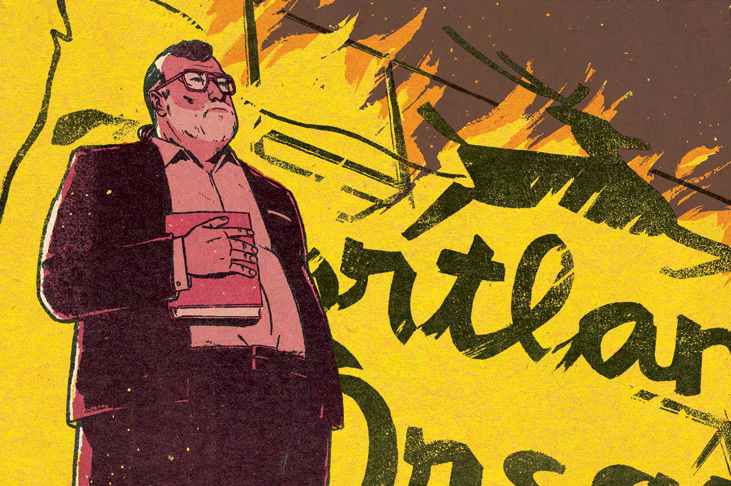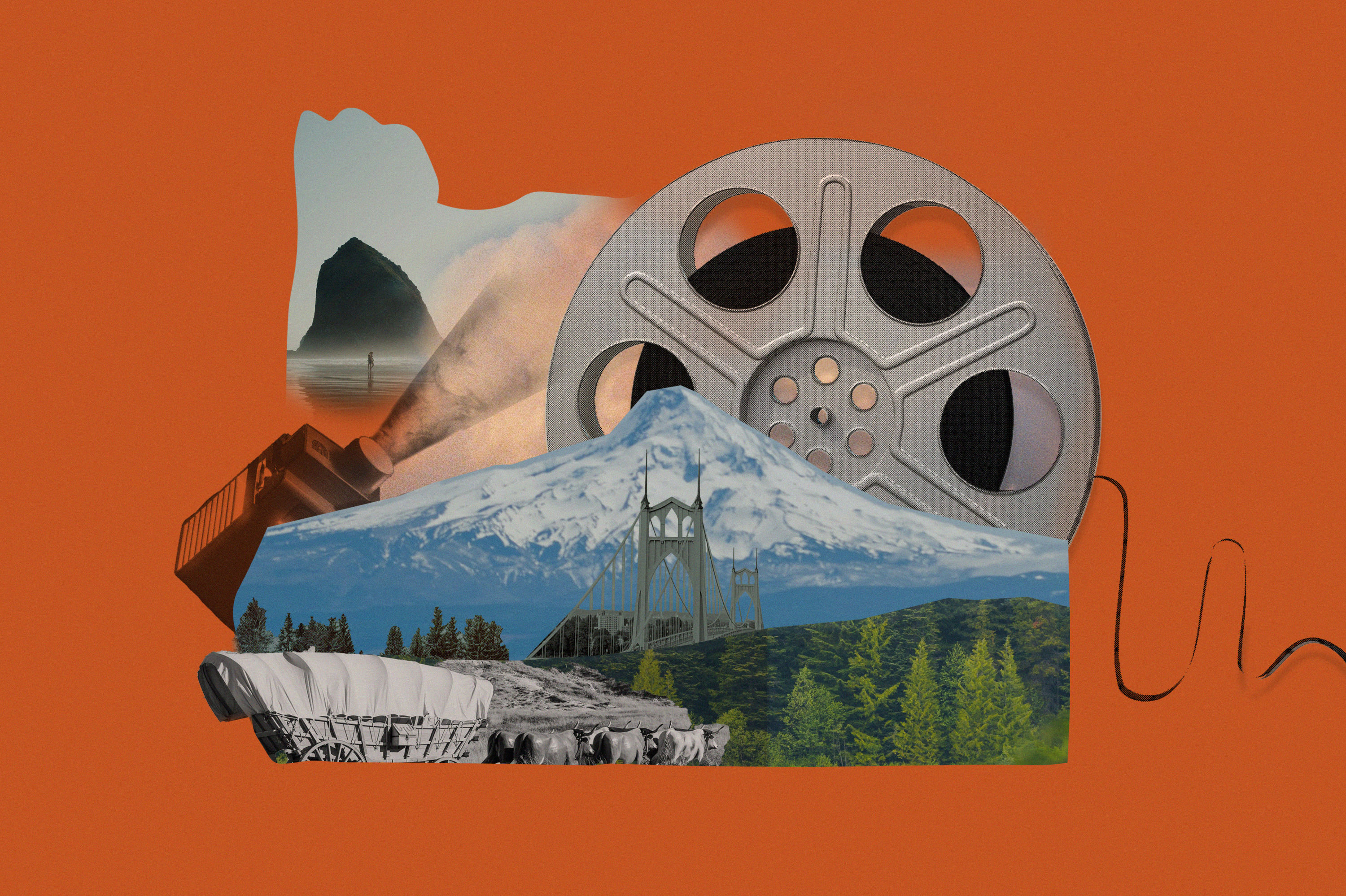The Destroyer

Image: Patrick Leger
The best-selling science fiction author has envisioned a postapocalyptic Oregon in his Emberverse series—complete with swords, castles, and a neofeudal empire centered on Portland. As he embarks on the eighth novel in the series, Stirling, who currently resides in New Mexico, opens up about the Rose City’s chances of survival at the end of the world.
The apocalypse is a venerable tradition in science fiction. It enables you to avoid the embarrassment of trying to write in the near future. If you write something set five years from now, you’ve got a ticking deadline, after which you’ll look completely ridiculous. Alternate histories, postapocalyptic or time-travel stories, they help you avoid that. My own conviction is that if you’re going to write in the future, you should write in the far future, when everything today is legendary.
The books start with “the Change,” which happens on March 17, 1998. There is a flash of light, a moment of intense pain, and all higher-energy technologies stop working. No electricity. No combustion engines. No explosives. Essentially, modern stuff doesn’t work.
The average city has a two-week supply of food. There’s no way to distribute it, there’s no way to communicate, no way to exchange information. You can’t even haul stuff on the roads because they’re blocked with cars that just stopped. No way to fight fires. No way to treat sewage. It’s a compendium of disasters.
Readers enjoy these stories because they like to think, “What would I do?” And in 99 percent of the cases, the answer would be: “Die.”
One of the things I like about this series is that I’ve given myself a canvas that has everything. I’ve got knights in armor, I’ve got neo-Celts, I’ve got cowboy stories, I’ve got Indians, pirates, you name it. I write for fun, and I read for fun. If it’s not fun, I’m not doing my job.
Before I started the series, I saw a long valley running north and south between mountains. For a little while I wasn’t quite sure whether it was the Willamette or the Shenandoah. Then I decided the Shenandoah was too close to the eastern megalopolis. And there were certain demographic things about the Northwest that were right for the story. Like there’s a heck of a lot of Wiccans in the Northwest, which figure prominently in the book.
The Pacific Northwest is the promised land of the bicyclist. We tend to lose sight of the fact that if you don’t have mechanical transportation, a mile is a long way. When the apocalypse hits, the bicycle becomes a serious political factor.
I needed a palace, and I wanted something fairly spectacular. I consulted my native guides, and one of them suggested the Multnomah County main library. It looked just right, both the location and the architecture. That becomes the city palace of the Lord Protector of the Portland Protective Association. The Park Blocks not far from the library become a jousting ground. And there’s a very large castle built just south of Portland.
Survivors tend to be mentally flexible. That’s why they contain a large percentage of rather eccentric types: they were mentally uncoupled from the status quo to begin with. It’s easier for them to assume that things have drastically and permanently altered. Anyone who sits waiting for the National Guard to arrive is toast. There’s a somewhat higher percentage of eccentrics in Portland. I’m afraid Seattle is completely wiped out.
I was actually born in France. My father was Canadian. He was in France with the Canadian Air Force in the early ’50s. We lived there and in Canada and in the States for a while. East Africa, too. We came back to Canada. Went to university there. Got a law degree. Went into writing. Married an American. Decided that I preferred the climate in New Mexico a heck of a lot more than I did Toronto’s, so I moved down here in 1995. I’m a naturalized citizen now.
I started reading science fiction and fantasy as soon as I was reading. You know, the usual kid stuff: H. Rider Haggard, Edgar Rice Burroughs, that sort of thing. I started telling stories as far back as I remember, when I was 5 or 6. I gradually, seamlessly segued into writing stuff down. Most of it of course was appallingly bad when I was young. But you learn. I published my first story in 1983 and sold my first novel in 1984. I went professional in 1988, and I’ve been doing it ever since.
I try to avoid returning to a common theme over and over. Writing springs out of the subconscious. There are certain tropes that resonate with you, and unless you watch it you’re gonna end up writing those things over and over again, under different names. I deliberately try to write as broad a spectrum of themes and characters as I can.
Most the mass dying happens offstage in the series. I write just enough to make people’s imaginations run riot. That’s actually the more effective way to deal with really bad stuff. Do it in strokes and then let people fill the rest in with their own minds. You’ve gotta know the details for yourself, but I generally don’t crowd a book with them.
The climate in Oregon is very suitable for the needs of the books. If you’re thrown back on your resources and you actually have to be a farmer, the Willamette Valley is about the best place in the temperate-zone world to do it. I needed something like Corvallis, too, for a university city-state. I had some fun with that. They eventually go into battle with Benny the Beaver flying overhead.
I’ve been through Oregon, though not as extensively as I’d like. Ideally, I would have liked to have spent months going over every place that I mention in the books. Unfortunately, that’s not always possible. I collected a massive amount of literature on the area: historical, geographic, economic, travel books, stuff on wildflowers and the birds. You have to know a great deal, even if you don’t put the stuff in the book. And besides, I’m a research fiend.
Spontaneous forms of neofeudalism occur in many areas after the Change because it’s more or less a default state when civilization collapses. But Portland goes the full monty.
If order collapses and the immediate problem is food, control of the means of production, is important as well as control and cultivation of land. Iowa is one of the places where this works out rather well because there’s a great deal of food there. California, on the other hand, does very badly indeed, I’m afraid. There are 14 million people in the LA basin, and without electric pumps the water would stop coming out of the taps within a couple of days.
Whenever you do a disaster series that involves a huge disaster, people accuse you of killing people off. I do like to point out that it’s fiction.
I write the book I’d like to read. Trying to write the market is usually futile and not much fun. And besides, the market’s a moving target. One thing’s fashionable one year, another thing’s fashionable the next year. You think you’ll write a vampire story, and the next year it’s zombies. So I just wrote a book I would consider fun, and the Change series seems to have struck with a fairly substantial audience. It’s very popular with the neo-pagan community, which is flattering. A lot of the characters are neo-pagans.
I do a fair amount of correspondence with fans, and in some cases they become part of my court of advisers. I like to build up a store of people who know about things, either places or occupations or ideas.
Whenever I’m writing a character who’s unlike me—a different gender or orientation or religion—I generally try to run what I’ve written past someone who’s closer to the character. That way you avoid obvious mistakes that you hadn’t seen. There’s an old saying, “It isn’t what you don’t know that will kill you, it’s what you think you know that isn’t so.” And that’s particularly so in cases like that.
It’s not that I’m anti-technology. On the contrary, I think it’s wonderful, and one of the themes of the book is that everything is harder and takes longer without it. But the people involved find out what’s in them when it’s taken away. Ordinary people are often capable of extraordinary accomplishments if circumstances demand them—a challenge and response thing.
There’s an element of luck to surviving. People have complained that the characters in my books are too lucky. But if you’re in a situation where 1 percent of the population survives, anyone who does is by definition a lottery winner. Somebody has to win.
I was a martial artist for a long time, and I’m interested in the history of small things people do to survive. Getting clean water, for instance. It’s really important to check the water you drink. Even the cleanest mountain stream may have a dead goat 300 yards upstream behind a tree and you don’t notice it. That’s why people more than a century or two back didn’t drink water if they could avoid it. They tended to cut it with alcohol. Part of it was just that they drank a lot. But it was actually a lot safer. Even a fairly dilute amount of alcohol in the water will kill a lot of the bacteria.
People don’t realize that up until about 150 years ago big cities were demographic sinks; they killed more people than were born in them. And the main reason was bad water. They were only kept going by people coming in from the countryside.
Even a cut finger is a deadly menace if you don’t have tetanus shots. I’ve noticed since my parents’ generation that people have become less cautious about contact with things that might be infectious, body fluids and such. We have more ways of dealing with infections than we used to.
Bubonic plague is endemic among ground squirrels in the West. There are a couple of cases in humans every year. But you put a lot of malnourished people without good medical care or sanitation together, and you’re going to get every plague known to humankind starting up again—to most of which we have no natural resistance because we weren’t exposed to any of the stuff as kids.
I don’t expect the Change to happen. But for more or less conventional disasters, the best thing is to have a certain amount of stuff on hand—preserved foods, water purification apparatus, gear, that sort of thing. And know how to get out of town. Also, know how to get out of town if you can’t drive.
It’s a dangerous world. None of us get out of it alive.
Tears of the Sun will be published in September 2011.




